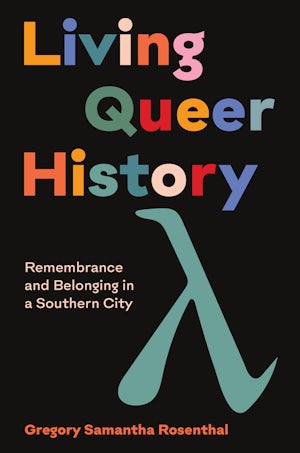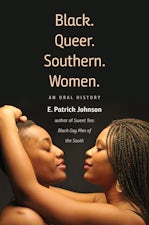Living Queer History
Remembrance and Belonging in a Southern City
By Gregory Samantha Rosenthal
288 pp., 6.125 x 9.25, 13 halftones
-
Paperback ISBN: 978-1-4696-6580-1
Published: December 2021 -
Hardcover ISBN: 978-1-4696-6579-5
Published: December 2021 -
E-book EPUB ISBN: 978-1-4696-6581-8
Published: October 2021 -
E-book PDF ISBN: 979-8-8908-6086-6
Published: October 2021
Buy this Book
- Paperback $29.95
- Hardcover $95.00
- E-Book $24.99
For Professors:
Free E-Exam Copies
Living Queer History tells the story of an LGBTQ community in Roanoke, Virginia, a small city on the edge of Appalachia. Interweaving historical analysis, theory, and memoir, Gregory Samantha Rosenthal tells the story of their own journey—coming out and transitioning as a transgender woman—in the midst of working on a community-based history project that documented a multigenerational southern LGBTQ community. Based on over forty interviews with LGBTQ elders, Living Queer History explores how queer people today think about the past and how history lives on in the present.
About the Author
Gregory Samantha Rosenthal is Associate Professor of History at Roanoke College and co-founder of the Southwest Virginia LGBTQ+ History Project.
For more information about Gregory Samantha Rosenthal, visit
the
Author
Page.
Reviews
“Living Queer History provides a model of how we can collectively make the past usable—not for academic institutions or urban developers—but for queer people today and in the future.”—Lauren Gutterman, QT Voices
“A brilliantly blended book that, much like queerness itself, transcends genre and blurs boundaries. Using memoir to look outward and history to look inward, Rosenthal makes theory concrete, finds the past in the present, and brings Roanoke’s overlooked queer demimonde to beautiful life.”--Samantha Allen, author of Real Queer America: LGBT Stories from Red States
“In Living Queer History, Samantha Rosenthal revels in the wondrous history of Roanoke’s storied queer past and present. At once deeply personal and political, this book reminds us that the South is not just home to sexual dissidents but is also a place of transition and transformative queer world-making.”--E. Patrick Johnson, author of Sweet Tea: Black Gay Men of the South
“This is an important book, speaking to some of the most contemporary queries and issues relating to LGBTQ people, cultures, and our histories. Carefully attentive to the ways in which race, ethnicity, class, and gender (among other identities and power systems) speak to and with LGBTQ identities of various stripes, the book delivers a persuasive challenge to continuing presumptions that the South has never been a space or place in which LGBTQ people or cultures or communities could emerge, let alone survive and thrive. Rather than a book ‘of history’ it is ultimately a book about history—how it is made, what gets missed or elided by even the most well-meaning of scholars.”—Leisa Meyer, author of Creating G.I. Jane: Sexuality and Power in the Women’s Army Corps During World War II
“A moving and necessary account of the way making history remakes ourselves, Living Queer History asks what it means for a queer person to have a place and to take up space in a straight world. With keen insight into their own queer life, Samantha Rosenthal combines personal narrative, oral history, activism, and queer theory to offer a fuller understanding of queer belonging.”—Jenn Shapland, author of My Autobiography of Carson McCullers




